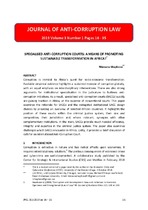| dc.contributor.author | Maphosa, Nkosana | |
| dc.date.accessioned | 2022-02-07T11:05:23Z | |
| dc.date.available | 2022-02-07T11:05:23Z | |
| dc.date.issued | 2019 | |
| dc.identifier.citation | Maphosa, N. (2019). Specialised anti-corruption courts: A means of promoting sustainable transformation in Africa?. Journal of Anti-Corruption Law, 3(1), 16-35. | en_US |
| dc.identifier.issn | 2521-5345 | |
| dc.identifier.uri | http://hdl.handle.net/10566/7183 | |
| dc.description.abstract | Corruption is inimical to Africa’s quest for socio-economic transformation.
Available empirical evidence highlights a sustained increase of corruption globally,
with an equal emphasis on interdisciplinary interventions. There are also strong
arguments for institutional specialisation in the judicature to buttress anticorruption initiatives. As a result, specialised anti-corruption courts (SACCs) quickly
are gaining traction in Africa, at the expense of conventional courts. This paper
examines the rationale for SACCs and the variegated institutional SACC design
choices by providing an overview of selected African countries. | en_US |
| dc.language.iso | en | en_US |
| dc.publisher | University of Western Cape | en_US |
| dc.subject | Anti-corruption courts | en_US |
| dc.subject | Africa | en_US |
| dc.subject | Corruption | en_US |
| dc.subject | Conventional courts | en_US |
| dc.subject | Criminal justice system | en_US |
| dc.title | Specialised anti-corruption courts: A means of promoting sustainable transformation in Africa? | en_US |
| dc.type | Article | en_US |

